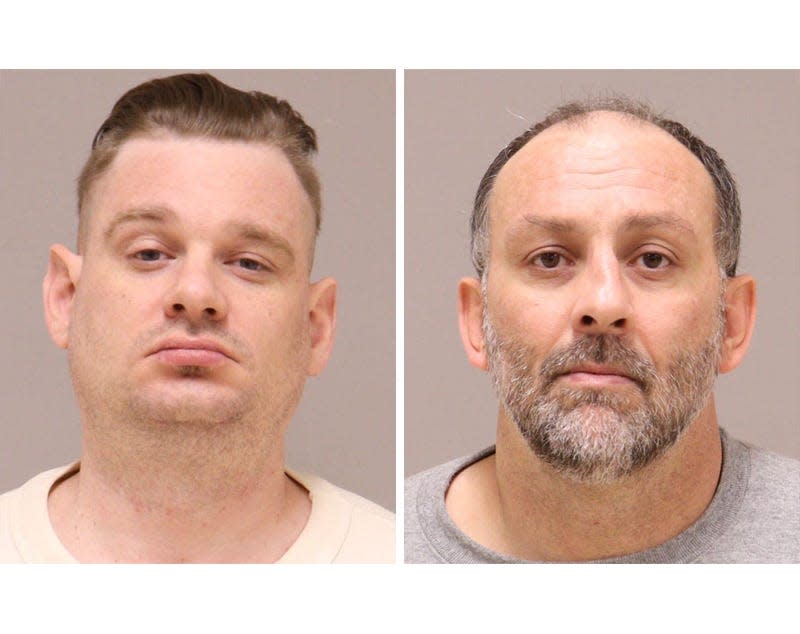Whitmer kidnap juror denies saying, 'These guys are going to hang,' transcript shows
- Oops!Something went wrong.Please try again later.
A juror in the Gov. Gretchen Whitmer kidnap trial spent seven minutes in the judge's chambers answering questions about purportedly telling co-workers that the juror would make sure "there's a guilty verdict" if picked to serve on the jury, or saying "these guys are going to hang, or words to that effect," according to a transcript of the private interview between the juror and the judge.
"So I can see the puzzled look on your face," the judge said during the interview. "Do you remember making statements like that at any time?"
"None," the juror responded.
"Just don't believe that ever came up," the judge continued.
"None," the juror responded.

What the judge asked the juror
The transcript filing offers a detailed look at the seven-minute conversation the judge had with the juror during a private interview in his chambers after a tipster claimed the juror had hoped to get picked for the jury, and wanted to convict Adam Fox and Barry Croft Jr. from the get-go.
The transcript redacted the juror’s identity, but noted the juror had a “puzzled look” when the judge told the person — it's not known whether the juror is male or female — of a misconduct allegation levied by a co-worker.
U.S. District Judge Robert Jonker told the juror that an allegation had been made that the juror told a co-worker he or she hoped to get picked for the Whitmer jury to make sure the defendants would be found guilty, or that “these guys are going to hang, words to that effect,” the judge said.
More:Jury convicts Adam Fox, Barry Croft Jr. in Whitmer kidnapping plot
More:How 3 controversial jurors wound up in the Whitmer kidnap jury box
Jonker asked whether the juror had any recollection of making such a statement at work, or if anyone could have overheard such a thing being said.
“None,” the juror replied, adding ... "I just said I have jury duty ... I didn't even know what the case was until I came in Tuesday morning when I glanced at a TV and saw news cameras out here, and I'm like, 'I think I know what case it is ... But I didn't tell anyone what case. I just said, 'I had jury duty.' "
The judge then asked: "So from your perspective, no reason to understand why anybody would have heard, overheard or believed somebody else heard you say something like that?"
“Yup,” the juror answered.
"OK. And no doubt about your ability to be fair from your perspective," the judge continued.
"Correct," the juror answered.
The judge added: “This is awkward for obvious reasons because now you really do feel like you got called into the principal’s office,” later saying, “I can tell that you are satisfied that you can continue” to be fair, "and you don't believe these things were said or can't even understand why somebody would think they overheard you say that."
Jonker dismissed the juror, asking that the conversation in chambers not be shared with other jurors.
"This would not be something I would want to talk or have discussed among other jurors on the case as well. You understand that?"
"Correct," the juror answered.

The judge then asked the juror whether anything he said "makes it uncomfortable for you in any way to continue" serving on the jury.
"Nope," the juror answered, concluding the interview.
The defense, meanwhile, expressed concern in a court filing, arguing that interview never should have been private and that the defense should have been allowed to sit in on it.
The judge disagreed, and allowed the juror to remain on the panel, concluding there was no proof of any bias, only hearsay.
The tip had come from a secondhand source — and the person who allegedly heard the juror say those things refused to be identified or come forward.
Fox and Croft, who will be sentenced separately in December, were convicted of kidnapping conspiracy and conspiracy to possess weapons of mass destruction. Croft was convicted on an additional weapons charge.
The men were judged by a second, more diverse jury than in a trial last spring, which ended with no convictions for the government. Two men were acquitted in that trial and the jury deadlocked on charges against Fox and Croft Jr., triggering a mistrial that prompted the government to try again. Two others pleaded guilty to federal crimes in the case, and others are charged in a separate state case.
Contact Tresa Baldas: tbaldas@freepreeson.com
This article originally appeared on Detroit Free Press: Whitmer kidnap juror denies saying, 'These guys are going to hang'

